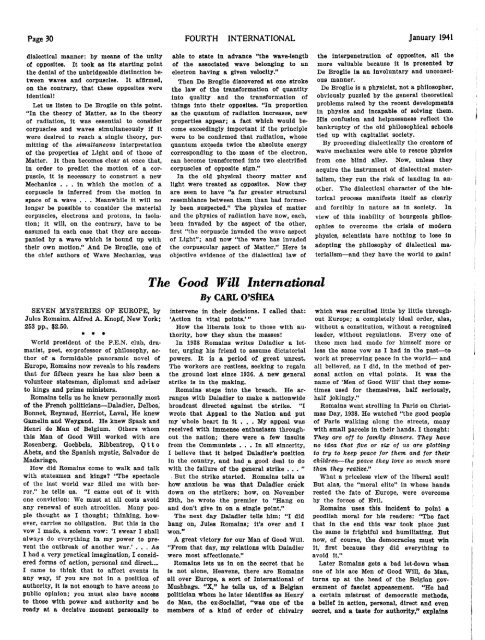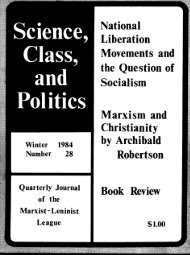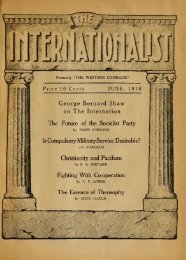January 1941 - Marxists Internet Archive
January 1941 - Marxists Internet Archive
January 1941 - Marxists Internet Archive
Create successful ePaper yourself
Turn your PDF publications into a flip-book with our unique Google optimized e-Paper software.
Page 30<br />
FOURTH<br />
INTERNATIONAL<br />
<strong>January</strong> <strong>1941</strong><br />
dialectical manner: by means of the unity<br />
of opposites. It took as its starting point<br />
the denial of the unbridgeable distinction between<br />
waves and corpuscles. It affirmed,<br />
on the contrary, that these opposites were<br />
identical!<br />
Let us listen to De BrogUe. on this point.<br />
"In the theory of Matter, as in the theory<br />
of radiation, it was essential to consider<br />
corpuscles and waves simultaneously if it<br />
were desired to reach a single theQry, permitting<br />
of the simultaneous interpretation<br />
of the properties of Light and of those of<br />
Matter. It then becomes clear at once that,<br />
in order to predict the motion of a corpuscle,<br />
it is necessary to construct a new<br />
Mechanics . . . in which the motion of a<br />
corpuscle is inferred from the motion in<br />
space of a wave . . . Meanwhile it will no<br />
longer be possible to consider the material<br />
corpuscles, electrons and protons, in isolation;<br />
it will, on the contrary, have to be<br />
assumed in each case that they are accompanied<br />
by a wave which is bound up with<br />
their own motion." And De Broglie, one of<br />
the chief authors of Wave Mechanics, was<br />
able to state in advance "the wave-length<br />
of the associated wave belonging to an<br />
electron having a given velocity."<br />
Then De Broglie discovered at one stroke<br />
the law of the transformation of quantity<br />
into quality and the transformation of<br />
things into their opposites. "In proportion<br />
as the quantum of radiation increases, new<br />
properties appear; a fact which would become<br />
exceedingly important if the principle<br />
were to be confirmed that radiation, whose<br />
quantum ex~eeds twice the absolute energy<br />
corresponding to the mass of the electron,<br />
can become transformed into two electrified<br />
corpuscles of opposite sign."<br />
In the old physical theory matter and<br />
light were treated as opposites. Now they<br />
are seen to have "a far greater structural<br />
resemblance between them than had formerly<br />
been suspected." The physics of matter<br />
and the physics of radiation have now, each,<br />
been invaded by the aspect of the other,<br />
first "the corpuscle invaded the wave aspect<br />
of Light"; and now "the wave has invaded<br />
the corpuscular /lspect of Matter." Here is<br />
objective evidence of the dialectical law of<br />
the interpenetration of opposites, all the<br />
more valuable because it is presented by<br />
De Broglie ia an involuntary and unconscious<br />
manner.<br />
De Broglie is a physicist, not a philosopher,<br />
obviously puzzled by the general theoretical<br />
problems raised by the recent developments<br />
in physics and incapable of solving them.<br />
His confusion and helpnessness reflect the<br />
bankruptcy of the old philosophical schools<br />
tied up with capitalist society.<br />
By proceeding dialectically the creators of<br />
wave mechanics were able to rescue physics<br />
from one blind alley. Now, unless they<br />
acquire the instrument of dialectical materialism,<br />
they run the risk of landing in another.<br />
The dialectical character of the historical<br />
process manif'ests itself as clearly<br />
and forcibly in nature as in society. In<br />
view of this inability of bourgeois philosophies<br />
to overcome the crisis of modern<br />
physics, scientists have nothing to lose in<br />
adopting the philosophy of dialectical materialism-and<br />
they have the world to gain!<br />
SEVEN MYSTERIES OF EUROPE, by<br />
Jules Romains. Alfred A. Knopf, New York;<br />
253 pp., $2.50.<br />
• • •<br />
World president of the P.E.N. club, dramatist,<br />
peet, ex-professor of philosophy, acthor<br />
of a formidable panoramic novel of<br />
Europe, Romains now reveals to his readers<br />
that for fifteen years he has alsO' been a<br />
volunteer statesman, diplomat and adviser<br />
to kings and prime ministers.<br />
Romains tells us he knew personally most<br />
of the French politicians-Daladier, Delbos~<br />
Bonnet, Reynaud, Herriot, Laval, He knew<br />
Gamelin and Weygandt He knew Spaak and<br />
Henri de :Man of Belgium. Others whom<br />
this Man of Good Will worked with are<br />
Rosenberg, Goebbels, Ribbentrop,. Q t t 0<br />
Abetz, and the Spanish mystic, Salvador de<br />
Madariago.<br />
How did Romains come to walk and talk<br />
with statesmen and kings? "The spectacle<br />
of the last world war filled me with horror,"<br />
he tells us. "I came out ot it with<br />
one conviction: We must at all costs avoid<br />
any renewal of such atrocities. Many people<br />
thought as I thought; thinking, however,<br />
carries no obligation. But this is the<br />
vow I made, a solemn vow: 'I swear I shall<br />
always do everything in my power to prevent<br />
the outbreak of another war.' ... As<br />
I had a very practical imagination, I considered<br />
forms of action, personal and direct ....<br />
I came to think that to affect events in<br />
any way, if you are not in a position of'<br />
authority, it is not enough to have access .to<br />
public opinion; you must also have access<br />
to those with power and authority and be<br />
ready at a decisive moment personally :to<br />
The Good Will International<br />
By CARL o'sHEA<br />
intervene in their decisions. I called that:<br />
'Action in vital points.'''<br />
How the liberals look to those with authority,<br />
how they shun the masses!<br />
In 1938 Romains writes Daladier a letter,<br />
urging his friend to assume dictatorial<br />
powers. It is a period of great unrest.<br />
The workers are restless, seeking to regain<br />
the ground lost since 1936. A new gt'neral<br />
strike is in the making.<br />
Romains steps into the breach. He arranges<br />
with Daladier to make a nationwide<br />
broadcast directed against the strike. "I<br />
wrote that Appeal to the Nation and put<br />
my 'whole heart in it •.. My appeal was<br />
received with immense enthusiasm throughout<br />
the nation; there were a few insults<br />
from the Communists ... In all Sincerity,<br />
I believe that it helped Daladier's position<br />
in the country, and had a good deal to do<br />
with the failure of the g~neral strike ... "<br />
. But the strike started. Romains tells us<br />
how anxious he was that Daladier crack<br />
down on the strikers; how, on Novem~er<br />
29th, he wrote the . premier to "Hang on<br />
and don't give in on a single point."<br />
The next day Daladier tells him: "I did<br />
hang on, Jules Romains; it's over and I<br />
won."<br />
A great victory for our Man of Good Will.<br />
"From that day, my relations with Daladier<br />
were most affectionate."<br />
Romains lets us in on the secret that he<br />
is not alone. Heavens, there are Romains<br />
all over Europe, a sort of International of<br />
Mushbags. "X," he tells us, of a Belgian<br />
politician whom he later identities as Henry·<br />
de Man, the ex-Socialist, "was one of the<br />
members of a kind of order ot chivalry<br />
which was recruited little by little throughout<br />
Europe; a completely ideal order, alas,<br />
without a constitution, without a recognized<br />
leader, without regulations. Everyone of<br />
these men had made for himself more or<br />
less the same vow as I had in the past-to<br />
work at preserving peace in the world- and<br />
all believed, as I did, in the method of personal<br />
action on vital points. It was the<br />
name of 'Men of Good Will' that they sometimes<br />
used for themselves, half seriously,<br />
half jokingly."<br />
Romains went strolling in Paris on Christmas<br />
Day, 1938. He watched "the good people<br />
of Paris walking along the streets, many<br />
with small parcels in their hands. I thought:<br />
They are of! to family dinners. They have<br />
no idea that five or six 01 us are plotting<br />
to try to keep peace lor them and lor their<br />
children-the peace they love so much more<br />
than they realize."<br />
What a priceless view of the liberal Boul!<br />
But alas, the "moral elite" in whose hands<br />
rested the fate of Europe, were overcome<br />
by the forces of Evil.<br />
Romains uses this incident to point a<br />
poodlish moral for his readers: "The fact<br />
that in the end this war took place just<br />
the Bame is frightful and humiliating. But<br />
now, of course, the democracies must win<br />
it,' first becaUfae they did everything to<br />
avoid it."<br />
Later Romains gets a bad let-down when<br />
one of his ace Men of Good Will, de Man,<br />
turns up at the head of the Belgian government<br />
ot fascist appeasement. "He had<br />
a certain ~istrust. of democrati~ methods,<br />
a belief in action, personal, direct and even<br />
secret, and a taste for authority," explains
















